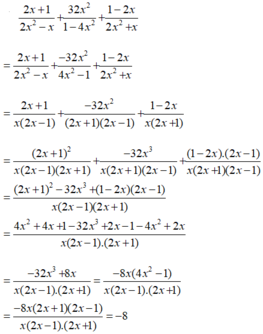

Hãy nhập câu hỏi của bạn vào đây, nếu là tài khoản VIP, bạn sẽ được ưu tiên trả lời.



\(\frac{2x}{x^2+4x+4}+\frac{x+1}{x+2}+\frac{2-x}{x^2+4x+4}\)
\(=\frac{2x}{\left(x+2\right)^2}+\frac{\left(x+1\right)\left(x+2\right)}{\left(x+2\right)^2}+\frac{2-x}{\left(x+2\right)^2}\)
\(=\frac{2x+x^2+3x+2+2-x}{\left(x+2\right)^2}\)
\(=\frac{x^2+4x+4}{\left(x+2\right)^2}\)
\(=\frac{\left(x+2\right)^2}{\left(x+2\right)^2}\)
\(=1\)

ĐK: x#0; x#-1
\(\frac{x^4}{1-x}\)+ x3 + x2 + 1
= \(\frac{x^4}{1-x}\)+ \(\frac{x^3\left(1-x\right)}{1-x}\)+ \(\frac{x^2\left(1-x\right)}{1-x}\)+ \(\frac{1-x}{1-x}\)
= \(\frac{x^4+x^3-x^4+x^2-x^3+1-x}{1-x}\)
= \(\frac{x+1}{1-x}\)

a: \(=\dfrac{1-2x+3+2y+2y-4}{6x^3y}=\dfrac{-2x+4y}{6x^3y}=\dfrac{-2\left(x-2y\right)}{6x^3y}=\dfrac{-x+2y}{3x^3y}\)
b: \(=\dfrac{x^2-2+2-x}{x\left(x-1\right)^2}=\dfrac{x\left(x-1\right)}{x\left(x-1\right)^2}=\dfrac{1}{x-1}\)
c: \(=\dfrac{3x+1+x^6-3x}{x^2-3x+1}\)
\(=\dfrac{x^6+1}{x^2-3x+1}\)
d: \(=\dfrac{x^2+38x+4+3x^2-4x-2}{2x^2+17x+1}\)
\(=\dfrac{4x^2+34x+2}{2x^2+17x+1}=2\)

- Muốn cộng hai phân thức cùng mẫu, ta cộng các tử với nhau và giữ nguyên mẫu.
- Muốn cộng hai phân thức khác mẫu, ta quy đồng mẫu thức rồi cộng các phân thức cùng mẫu vừa tìm được.
\(\dfrac{3x}{x^3-1}+\dfrac{x-1}{x^2+x+1}\)
\(=\dfrac{3x}{\left(x-1\right)\left(x^2+x+1\right)}+\dfrac{\left(x-1\right)\left(x-1\right)}{\left(x-1\right)\left(x^2+x+1\right)}\)
\(=\dfrac{3x+x^2-2x+1}{\left(x-1\right)\left(x^2+x+1\right)}\)
\(=\dfrac{x^2+x+1}{\left(x-1\right)\left(x^2+x+1\right)}\)
\(=\dfrac{1}{x-1}\)

a, \(\frac{x^{32}+x^{16}+1}{x^{16}+x^8+1}\)
\(=\frac{x^8+x^4+1}{x^4+x^2+1}\) Vậy phân thức \(a=\frac{x^8+x^4+1}{x^4+x^2+1}\)
P/s; Căn thức a, là phân số tối giản
b, \(\frac{x^8+3x^4+4}{x^4+x^2+2}\)
\(=\frac{x^4+3x^2+2}{x^2+x^1+1}\) Vậy căn thức \(b=\frac{x^4+3x^2+2}{x^2+x^1+1}\)
P/s; Căn thức b, có thể rút gọn được cho 2 và 4
Em ko chắc đâu nhé *-*